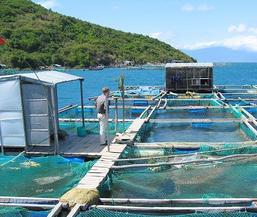Hawaii's Major Industries

Aquaculture
Honolulu began its economic life in the mid-nineteenth century as a port for whalers; it was also a trade center for nations bordering the Pacific, dealing in such goods as sandalwood, whale oil, and fur. While markets for sandalwood and whale oil decreased, sugar and pineapple markets increased dramatically. In fact, the powerful sugar industry, owned mainly by Americans, engineered the downfall of Hawaii's last monarch and the islands' annexation by the United States. Today, one-fifth of the land in Honolulu County is zoned for agriculture, but fields are now giving way to new homes and commercial development. With the closure of sugar plantations, challenges arise to find the most productive use for these lands. Diversified agriculture has been on a steady upward trend. Aquaculture, which includes cultivated species of shellfish, finfish and algae, has grown in recent years. In 2002, Honolulu county had 30 aquaculture operations which produced $4.2 million in sales.
In addition to serving as the business and trading hub of the Hawaiian Islands, Honolulu is the transportation crossroads of the Pacific, connecting East with West. The city's recently expanded harbor facilities handle cargo for several international steamship companies, and a Foreign Trade Zone is based there. Other important elements of Honolulu's economic base include tourism, military defense, research and development, and manufacturing. With millions of visitors coming each year to enjoy Honolulu's climate and beaches, tourism contributes $10 billion annually to the local economy. Pearl Harbor Naval Shipyard, Marine Base Kaneohe, and Schofield Barracks Army base provide revenues that are unaffected by the normal business cycle. As the home of the University of Hawaii at Manoa, Honolulu is a center for research and development, especially in the areas of oceanography, astrophysics, geophysics, and biomedicine. The city and county of Honolulu also contains many commercial, industrial and retail properties. Food and food products account for about one-third of the total annual value of shipments by manufacturers, including sugar and pineapples. Other major industries are clothing; stone, clay, and glass products; fabricated metals; and shipbuilding. Hawaii's publicly held corporations include Amfac, involved in food processing, merchandising, and land development; and Castle & Cooke, which owns the Dole and Bumble Bee food product lines. Other corporations are Dillingham, which is involved in maritime industries and land development, and Brewer (owned by IU International), which produces 20% of the state's sugar and more than half the world's macadamia nuts.
In addition to serving as the business and trading hub of the Hawaiian Islands, Honolulu is the transportation crossroads of the Pacific, connecting East with West. The city's recently expanded harbor facilities handle cargo for several international steamship companies, and a Foreign Trade Zone is based there. Other important elements of Honolulu's economic base include tourism, military defense, research and development, and manufacturing. With millions of visitors coming each year to enjoy Honolulu's climate and beaches, tourism contributes $10 billion annually to the local economy. Pearl Harbor Naval Shipyard, Marine Base Kaneohe, and Schofield Barracks Army base provide revenues that are unaffected by the normal business cycle. As the home of the University of Hawaii at Manoa, Honolulu is a center for research and development, especially in the areas of oceanography, astrophysics, geophysics, and biomedicine. The city and county of Honolulu also contains many commercial, industrial and retail properties. Food and food products account for about one-third of the total annual value of shipments by manufacturers, including sugar and pineapples. Other major industries are clothing; stone, clay, and glass products; fabricated metals; and shipbuilding. Hawaii's publicly held corporations include Amfac, involved in food processing, merchandising, and land development; and Castle & Cooke, which owns the Dole and Bumble Bee food product lines. Other corporations are Dillingham, which is involved in maritime industries and land development, and Brewer (owned by IU International), which produces 20% of the state's sugar and more than half the world's macadamia nuts.
